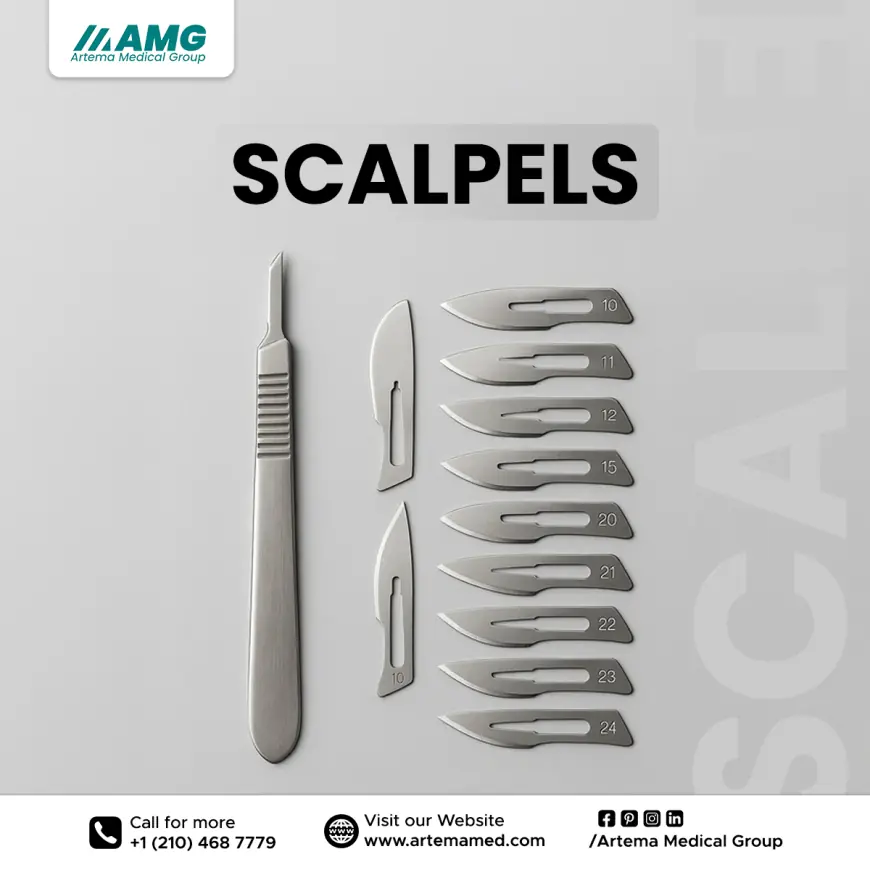The Importance of Scalpels in Modern Surgery
Scalpels are among the most important instruments in the medical field. They are essential for performing precise cuts during surgeries and other medical procedures.

Scalpels are among the most important instruments in the medical field. They are essential for performing precise cuts during surgeries and other medical procedures. Without this tool, it would be almost impossible to carry out delicate operations. The design of a scalpel allows surgeons to work with accuracy, reducing risks and improving recovery for patients. Understanding the importance of this instrument helps us see why it is considered a fundamental part of every surgical setup.
Why Scalpels Are Essential in Surgery
A scalpel plays a key role in almost every surgical procedure. It is used to make accurate incisions, which is critical for a successful operation. When a surgeon uses a surgical scalpel, the precision of the blade ensures that surrounding tissues remain undamaged. This minimizes complications and helps patients recover faster. Unlike other cutting tools, a scalpel provides the level of control needed for sensitive procedures where even the smallest error can have serious consequences.
The Role of a Scalpel Knife in Accuracy
A scalpel knife is not just a sharp blade; it is a symbol of precision. Surgeons depend on this instrument because it offers smooth, clean cuts that reduce trauma to the body. When the cut is clean, healing is quicker, and the chances of infection are lower. This is why the scalpel knife is used in all types of surgeries, including general operations, cosmetic procedures, and even delicate brain surgeries. The accuracy it offers is unmatched by any other tool.
How Scalpels Improve Patient Outcomes
The importance of scalpels goes beyond making incisions. A surgical scalpel helps reduce surgical time by allowing quick and efficient cuts. This means less exposure of internal organs and reduced risk of complications. When surgeries are performed with sharp and precise tools, patients experience less pain after the procedure. In addition, the risk of scarring is lower because the cuts are clean. This is especially important in surgeries that require aesthetic considerations, such as plastic or reconstructive procedures.
Different Uses of Scalpels in Medicine
Scalpels are not limited to one type of surgery. They are used in a wide range of medical fields, including general surgery, orthopedic surgery, and cardiovascular procedures. In hospitals and clinics, doctors also use them for minor treatments like removing skin lesions or draining abscesses. Even outside of operating rooms, a scalpel knife is used in pathology labs for dissections and sample preparation. This shows how important this tool is in almost every aspect of medicine.
The Importance of Sterility in Scalpel Use
One of the key aspects of using scalpels is ensuring they are sterile. A surgical scalpel must be completely free from germs before use, as any contamination can lead to infections. Disposable scalpels are often used for this reason because they eliminate the need for sterilization after each use. However, reusable scalpels are still common and must be cleaned and sterilized properly. Maintaining sterility is just as important as the sharpness of the blade when it comes to patient safety.
The Role of Scalpel Design in Modern Surgery
Modern scalpel designs are focused on improving safety and performance. Handles are now designed to provide a comfortable grip for surgeons during long operations. Some blades come with coatings that keep them sharper for a longer time, reducing the need for frequent replacements. There are also advanced versions like electric and laser scalpels, which cut tissue while sealing blood vessels at the same time. These innovations show how the importance of scalpels has grown with technology.
Scalpel Safety in Medical Practice
Handling a scalpel requires care because of its sharpness. Medical professionals are trained to hold and pass the instrument in a way that reduces the risk of injury. After use, the blade should be removed safely and placed in a special container to prevent accidental cuts. A surgical scalpel is not just a tool; it is a responsibility. Safe handling ensures that the benefits of this instrument are not overshadowed by preventable accidents.
Comparing Scalpel Knives to Other Cutting Tools
While there are other surgical tools that can cut tissue, none match the precision of a scalpel knife. Scissors and other instruments are useful in some procedures, but when it comes to fine incisions, a scalpel remains the first choice. This is why it is considered one of the most important instruments in any surgical set. The ability to make exact cuts with minimal damage makes the scalpel indispensable in medical practice.
Conclusion
The importance of scalpels in medicine cannot be overstated. From the smallest skin incision to the most complex surgical procedure, this tool ensures accuracy, safety, and better patient outcomes. A surgical scalpel is more than just a knife; it is a symbol of precision and care in the medical world. As technology advances, the role of scalpels continues to grow, with new designs improving efficiency and reducing risks. Without this essential tool, modern surgery as we know it would not be possible.
More info: Artema Medical
What's Your Reaction?
 Like
0
Like
0
 Dislike
0
Dislike
0
 Love
0
Love
0
 Funny
0
Funny
0
 Angry
0
Angry
0
 Sad
0
Sad
0
 Wow
0
Wow
0
















































